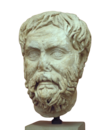Herodotus (physician)
| Part of a series on |
| Pyrrhonism |
|---|
 |
|
|
Herodotus (/hɪˈrɒdətəs/; Ancient Greek: Ἡρόδοτος, Hêródotos, Greek pronunciation: [hɛː.ró.do.tos]) was the name of more than one physician in the time of ancient Greece and Rome:
- A pupil of Athenaeus, or perhaps Agathinus,[1] who belonged to the Pneumatic school.[2] He probably lived towards the end of the 1st century AD, and lived at Rome, where he practised medicine with great success.[1] He wrote some medical works, which are several times quoted by Galen and Oribasius, but of which only some fragments remain.
- The son of Arieus, a native either of Tarsus or Philadelphia, who was a Pyrrhonist philosopher and physician who probably belonged to the Empiric school of medicine. He was a pupil of Menodotus of Nicomedia, and tutor to Sextus Empiricus, and lived therefore in the 2nd century AD.[3]
- The physician mentioned by Galen,[4] together with Euryphon, as having recommended human milk in cases of consumption, was probably a different person from either of the preceding, and may have been a contemporary of Euryphon in the 5th century BC.
References
Inline citations
- ^ a b Galen, De Differ. Puls., iv. 11, vol. viii.
- ^ Galen, De Simplic. Medica. Temper. ac Facult., i. 29, col. xi.
- ^ Laërtius, Diogenes; Yonge, Charles Duke (1853). "Diogenes Laertius: Life of Timon, from Lives of the Philosophers, translated by C.D. Yonge". Peithô's Web: Classics of Rhetoric and Persuasion. London: Henry G. Bohn. Archived from the original on 20 April 2017. Retrieved 7 April 2018.
Antiochus again, was the master of Menodotus, of Nicomedia, a skilful physician, and of Theodos, of Laodicea; and Menodotus was the master of Herodotus, of Tarsus, the son of Arieus; Herodotus was the master of Sextus Empiricus, who left ten books of Sceptic Maxims, and other excellent works...
- ^ Galen, De Bon. et Prav. Aliment. Succ., c. 4. vol. vi.; De Meth. Med., vii. 6. vol. x
Sources referenced
 This article incorporates text from a publication now in the public domain: Smith, William, ed. (1870). Dictionary of Greek and Roman Biography and Mythology.
This article incorporates text from a publication now in the public domain: Smith, William, ed. (1870). Dictionary of Greek and Roman Biography and Mythology. {{cite encyclopedia}}: Missing or empty|title=(help)
